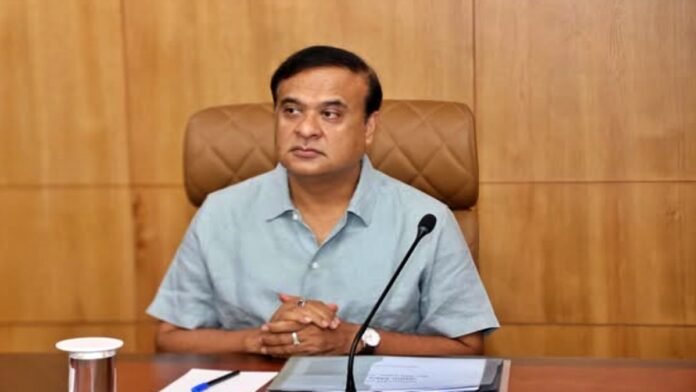
Key Points:
- Assam Cabinet approves new SOP under Immigrants (Expulsion from Assam) Act, 1950 giving 10-day deadline for citizenship proof
- District Commissioners now empowered to issue evacuation orders without going through Foreigners Tribunals
- 75-year-old Nehru-era law reactivated after remaining dormant since Liaquat-Nehru Pact in 1950
- Suspected foreigners will be sent to detention centers and deported to Bangladesh or Pakistan if documents unsatisfactory
- Foreigners Tribunals’ role significantly reduced – only complex cases will go to tribunals now
Dispur: The Himanta Biswa Sarma government has taken a decisive step in Assam’s long-standing battle against illegal immigration by approving a groundbreaking Standard Operating Procedure (SOP) that empowers District Commissioners to directly determine citizenship status. The Cabinet decision, announced on September 9, 2025, marks a significant shift from the traditional tribunal-based system to a more expedited administrative process.
Revolutionary Changes in Citizenship Verification Process
Under the new SOP, District Commissioners will issue notices to suspected foreigners based on information from border police or other sources, giving them exactly 10 days to prove their Indian citizenship. This represents a dramatic departure from the previous system where cases were referred to Foreigners Tribunals, often resulting in prolonged legal proceedings.
Chief Minister Himanta Biswa Sarma explained the streamlined process: “If the Deputy Commissioner is not satisfied with the documents provided, he will directly order evacuation. The person will be taken to the detention center, from where the BSF will send them back to Bangladesh or Pakistan”.
Foreigners Tribunals Role Minimized
The new system effectively neutralizes the role of Foreigners Tribunals in most cases, with CM Sarma clarifying that tribunals will now handle only those cases where District Magistrates cannot reach concrete conclusions. This change addresses long-standing complaints about the slow pace of the tribunal system, which has been criticized for creating backlogs in citizenship determination cases.
Previously, suspected foreign nationals would go through a lengthy legal process in Foreigners Tribunals. Now, only cases with ambiguous evidence will be referred to tribunals, while clear-cut cases will be handled directly by district administration.
Reactivation of 1950 Nehru-Era Legislation
The SOP operates under the Immigrants (Expulsion from Assam) Act, 1950 (IEAA), originally enacted by then-Prime Minister Jawaharlal Nehru’s government under pressure from Assam to halt migration from East Pakistan following partition. The law had remained largely dormant since the Liaquat-Nehru Pact was signed just a month after its implementation.
The Act empowers the central government to expel outsiders whose presence in Assam is deemed detrimental to national interests or local tribal communities. However, then-Chief Minister Gopinath Bardoloi was instructed to suspend its implementation following the 1950 pact, leaving the legislation inactive for over seven decades.
Current Immigration Context in Assam
This policy shift comes at a time when Assam continues to grapple with immigration-related challenges. Interestingly, the Citizenship Amendment Act (CAA) has had minimal impact in the state, with CM Sarma revealing that only 12 applications have been received under CAA, and merely 3 individuals have been granted citizenship as of September 2025.
The low CAA application numbers have surprised many, considering the massive protests in 2019 that resulted in five deaths and widespread unrest when the legislation was first introduced. Sarma noted: “There was a huge hue and cry that 20 to 25 lakh people would get citizenship in Assam. But we have received only 12 applications”.
Recent Federal Policy Changes
The new Assam SOP comes alongside recent federal developments in immigration policy. The Ministry of Home Affairs issued the Immigration and Foreigners (Exemption) Order, 2025 on September 1, 2025, providing protection to Hindu, Sikh, Buddhist, Jain, Parsi, and Christian minorities from Afghanistan, Bangladesh, and Pakistan who entered India up to December 31, 2024.
This federal order exempts these communities from passport and visa requirements but does not provide automatic citizenship, unlike the CAA which has a 2014 cutoff date for citizenship applications.
Opposition and Legal Concerns
The policy has drawn criticism from opposition parties. Congress leader Debabrata Saikia argued that such measures violate the spirit of the Assam Accord, while Trinamool Congress MP Sushmita Dev questioned the government’s broader immigration strategy and its impact on those currently in detention centers.
Legal experts note that while the new SOP expedites the process, it maintains due process protections by providing a 10-day notice period and allowing appeals through the tribunal system for complex cases.
Implementation and Future Impact
The immediate implementation of this SOP signals the Assam government’s commitment to addressing illegal immigration through administrative efficiency rather than prolonged legal proceedings. The policy is expected to significantly reduce the burden on Foreigners Tribunals while providing faster resolution of citizenship determination cases.
With District Commissioners now serving as the first line of citizenship verification, the new system aims to balance administrative efficiency with procedural fairness. The success of this approach will likely influence similar policies in other border states facing immigration challenges.




















































